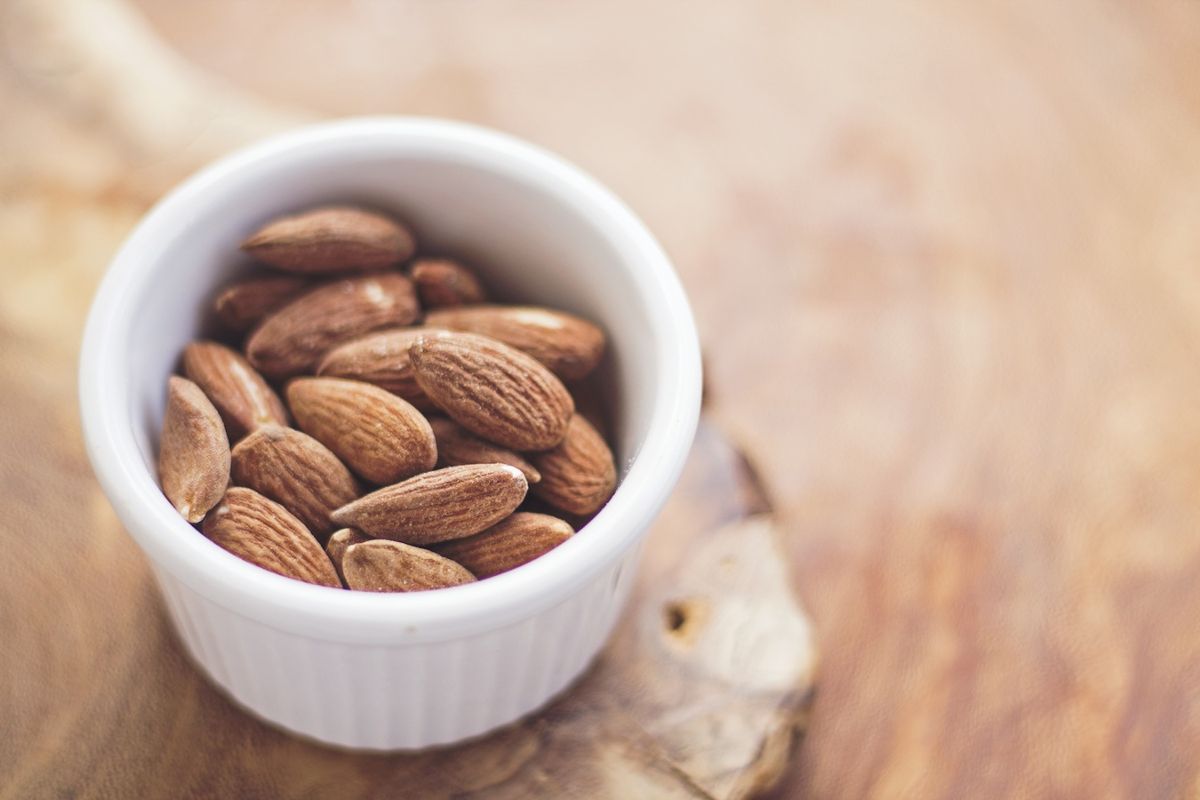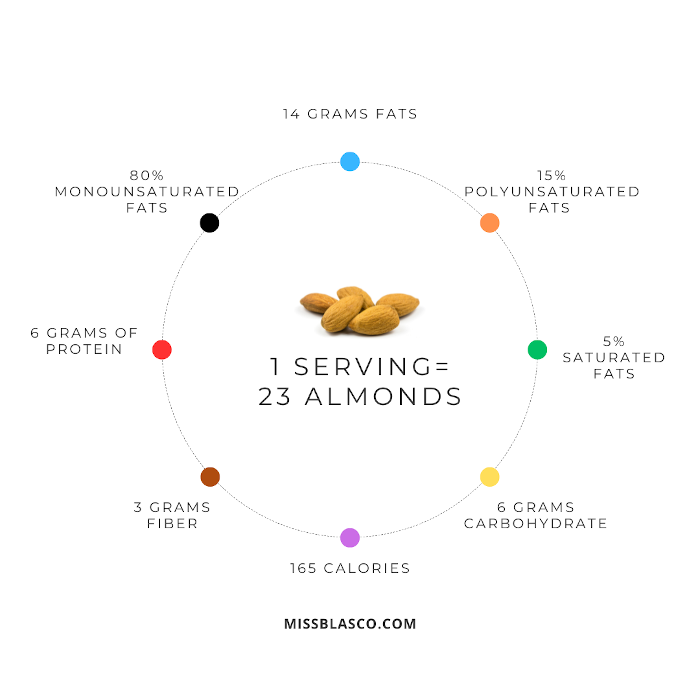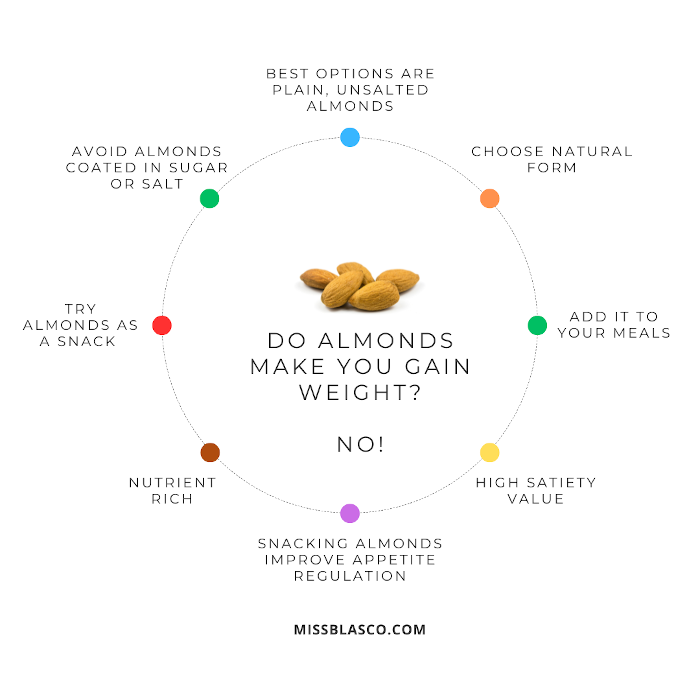
Do Almonds Make You Gain Weight?
Do Almonds Make You Gain Weight? The Truth About Almonds and Weight Control
Almonds are often misunderstood when it comes to weight management. Because they are calorie-dense and high in fat, many people worry that eating almonds will inevitably lead to weight gain. But scientific evidence tells a different story.
In fact, almonds are nutrient-dense foods that provide healthy fats, protein, fiber, vitamins, and minerals. When consumed in moderation, almonds not only do not promote weight gain, but they may actually support weight management by increasing satiety, regulating appetite, and replacing less healthy food choices.
In this article, we’ll explore the science behind almonds and weight, break down their nutritional profile, review recent clinical studies, and provide practical tips for including almonds in a balanced diet without fear of unwanted weight gain.
Nutritional Profile of Almonds
A standard serving of almonds is about 1 ounce (28 grams), or roughly 23 almonds, providing approximately 160–165 calories. Despite being calorie-dense, almonds are also one of the most nutrient-rich snack options available.
Here’s what one serving contains:
- Calories: 160–165
- Protein: 6 grams
- Fat: 14 grams (80% monounsaturated, 15% polyunsaturated, 5% saturated)
- Carbohydrates: 6 grams
- Fiber: 3 grams
Most of the fat in almonds is monounsaturated fat, which is associated with better heart health. Their protein and fiber content also contribute to prolonged satiety, helping to reduce hunger and limit overeating later in the day.
Almonds are nutrient-dense foods that promote satiety and help regulate appetite.
Do Almonds Cause Weight Gain?
The short answer is no—almonds do not make you gain weight when consumed in appropriate portions. Although they are energy-dense, their composition and physiological effects on satiety, appetite regulation, and metabolism actually make them weight-friendly.
Several factors explain why almonds behave differently from other calorie-dense foods:
- Satiety effect: The combination of fiber, protein, and healthy fats reduces hunger and helps you feel full longer.
- Lower metabolizable energy: Some of the fat in almonds is not fully absorbed by the body, which means the actual usable calories may be less than what is listed.
- Food displacement: Eating almonds may replace less healthy, higher-calorie snacks such as chips or sweets.
- Increased resting energy expenditure: Almonds may slightly boost metabolism, increasing the number of calories burned at rest.

Evidence From Clinical Studies
Scientific research strongly supports the idea that almonds are not linked to weight gain.
- A review published in Nutrients analyzed 64 randomized controlled trials (RCTs) and 14 systematic reviews/meta-analyses. It found that almonds acted as a higher energy-dense food that behaved like a lower energy-dense food when consumed, due to reduced bioavailability of their fats and enhanced satiety.
- Systematic reviews and meta-analyses of nut RCTs showed that almonds were the only nut associated with a small but significant decrease in both body mass and fat mass compared to control diets.
- A 2021 systematic review in Obesity Reviews concluded that nut consumption, including almonds, does not increase body fat levels. Instead, nuts may play a role in the prevention of long-term weight gain and obesity-related diseases.
These findings highlight that almonds are not only safe to include in weight management diets but may actually provide a protective effect against fat gain.
Research shows almonds do not cause weight gain and may even reduce body fat.
How Almonds Support Weight Management
Almonds contribute to healthy weight control through several mechanisms:
- Regulating appetite: Almonds trigger hormonal signals that reduce hunger and increase fullness.
- Nutrient density: They deliver essential nutrients in relatively small portions, supporting balanced diets without excess calories.
- Displacement of less healthy foods: Choosing almonds over refined snacks reduces overall calorie intake and improves diet quality.
- Metabolic benefits: Almonds support stable blood sugar levels, improve cholesterol profiles, and enhance cardiovascular health, which are key for long-term weight management.
How to Incorporate Almonds Into Your Diet
While almonds can be part of a healthy diet, portion control matters. Overeating even healthy foods can contribute to excessive calorie intake. Stick to the recommended serving size of 1 ounce (23 almonds) per day.
Here are some practical tips:
- Choose plain, unsalted almonds: Avoid varieties coated in sugar, honey, or salt, as these add unnecessary calories and reduce satiety.
- Use almonds in meals: Sprinkle chopped almonds over salads, yogurt, or oatmeal for added crunch and nutrition.
- Snack smartly: Pair almonds with fruit or raw vegetables for a balanced snack.
- Blend them into smoothies: A tablespoon of almond butter adds creaminess and extra nutrients.
- Bake with almond flour: Use almond flour as a gluten-free, low-carb alternative to refined flour.

Lifestyle and Dietary Context
The effect of almonds on weight depends not only on the nuts themselves but also on overall lifestyle and diet. Replacing processed foods such as refined grains or processed meats with almonds and other nutrient-dense options can reduce the risk of obesity and chronic diseases.
Healthcare experts generally recommend nuts, including almonds, as part of a healthy eating pattern. Unless you have an allergy, almonds are considered safe, beneficial, and compatible with weight control.
A portion of 23 almonds a day can support healthy weight management and overall well-being.
So, do almonds make you gain weight? The answer is clear: no, when eaten in moderation, almonds do not cause weight gain. On the contrary, they can help with satiety, support appetite regulation, and even contribute to weight control when part of a balanced diet.
If you are concerned about calories, remember that almonds are both energy-dense and nutrient-dense. The key is mindful eating and portion control.
Almonds can be enjoyed daily as a snack, incorporated into meals, or used as an ingredient in healthy recipes. By choosing them over less nutritious options, you support not only your weight goals but also your overall health.
If you have specific dietary needs, consult a registered dietitian for personalized advice.
Sources:
– Baer, D. J., Dalton, M., Blundell, J., Finlayson, G., & Hu, F. B. (2023). Nuts, Energy Balance and Body Weight. Nutrients, 15(5), 1162. https://doi.org/10.3390/nu15051162
– Dreher M. L. (2021). A Comprehensive Review of Almond Clinical Trials on Weight Measures, Metabolic Health Biomarkers and Outcomes, and the Gut Microbiota. Nutrients, 13(6), 1968. https://doi.org/10.3390/nu13061968
– Nishi, S. K., Viguiliouk, E., Mejía, S. B., Kendall, C. W., Bazinet, R. P., Hanley, A. J., Comelli, E. M., Salas‐Salvadó, J., Jenkins, D., & Sievenpiper, J. L. (2021). Are fatty nuts a weighty concern? A systematic review and meta‐analysis and dose–response meta‐regression of prospective cohorts and randomized controlled trials. Obesity Reviews, 22(11). https://doi.org/10.1111/obr.13330
– Hazell, T. J., Islam, H., Townsend, L. K., Schmale, M. S., & Copeland, J. L. (2016). Effects of exercise intensity on plasma concentrations of appetite-regulating hormones: Potential mechanisms. Appetite, 98, 80–88. https://doi.org/10.1016/j.appet.2015.12.016
Want to try them in your kitchen? Check out my almond recipes: